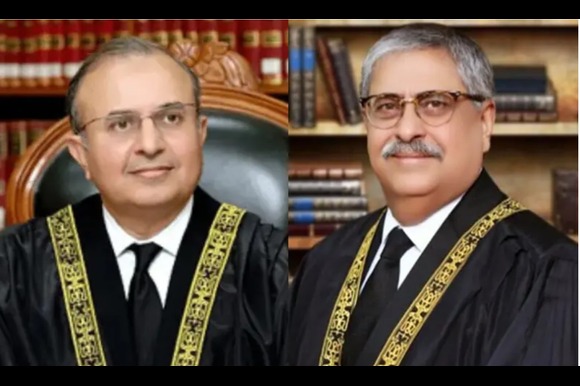Islamabad — November 2025:
In a dramatic development that has shaken Pakistan’s judiciary, two senior justices of the Supreme Court — Justice Mansoor Ali Shah and Justice Athar Minallah — have tendered their resignations in protest against the recently passed 27th Constitutional Amendment, calling it a direct attack on the country’s Constitution and judicial independence.
Resignations Spark Judicial Crisis
Justice Mansoor Ali Shah, who was considered one of the court’s most respected and reform-minded jurists, submitted his resignation to the President of Pakistan earlier this week. His letter described the 27th Amendment as a “grave assault on the Constitution” and a “systematic attempt to dismantle the Supreme Court.”
Shortly after, Justice Athar Minallah, a former Chief Justice of the Islamabad High Court and a sitting Supreme Court judge, followed suit. In his resignation letter, Justice Minallah expressed deep concern over what he called the “end of the constitutional order” he had sworn to protect.
“I took an oath to defend the Constitution, not a version rewritten under executive pressure,” he wrote.
Both judges announced their decision following the official promulgation of the 27th Amendment, which was swiftly approved by Parliament amid controversy and public protests from legal circles.
What the 27th Amendment Changes
The 27th Amendment significantly restructures Pakistan’s judicial system.
Key provisions include:
- The establishment of a Federal Constitutional Court (FCC), which will take over all constitutional interpretation cases previously heard by the Supreme Court.
- The reduction of the Supreme Court’s jurisdiction, limiting its ability to rule on constitutional petitions and fundamental rights cases.
- Amendments to judicial appointments and oversight mechanisms, effectively increasing executive influence over judicial affairs.
- Additional clauses that grant legal immunity and extended powers to the military leadership, particularly elevating the Chief of Army Staff (Gen. Asim Munir) to the new position of Chief of Defence Forces, with authority over all three armed services.
These sweeping changes have been viewed by critics as a power consolidation measure and an erosion of the separation of powers — a cornerstone of Pakistan’s constitutional framework.
Strong Backlash from the Legal Community
The resignations have prompted an outcry from the legal fraternity, opposition parties, and civil rights groups.
The Pakistan Bar Council (PBC) and Supreme Court Bar Association (SCBA) issued a joint statement calling November 2025 “one of the darkest days in Pakistan’s judicial history.”
“The resignation of two senior judges is a warning that the judiciary is being stripped of its independence,” said one senior lawyer, adding that “the 27th Amendment reduces the Supreme Court to an executive-controlled tribunal.”
Protests have erupted in several major cities, including Lahore, Islamabad, and Karachi, where lawyers marched demanding the repeal of the amendment and the restoration of full judicial autonomy.
Political Context and Military Influence
Analysts say the amendment reflects the growing influence of the military establishment in Pakistan’s political and legal systems.
Under the new law, Gen. Asim Munir’s position is not only secured but enhanced, with expanded powers and lifetime legal immunity. This change has been seen by observers as a formal codification of military dominance within Pakistan’s constitutional structure.
The Federal Constitutional Court, which will now oversee constitutional disputes, is expected to have its judges appointed through mechanisms that critics argue allow direct executive oversight, effectively sidelining the existing Supreme Court bench.
Uncertain Future for the Judiciary
Legal experts warn that these developments may cause long-term institutional damage.
With two senior justices stepping down, the Supreme Court is facing an internal legitimacy crisis, and there are reports that other high court judges may follow suit or be transferred under the new legal framework.
International observers, including human rights organizations, have raised concerns over the shrinking space for judicial independence and the concentration of power in the hands of the executive and military.
Conclusion
The resignations of Justices Mansoor Ali Shah and Athar Minallah mark a defining moment in Pakistan’s constitutional history.
Their departure underscores deep divisions within the judiciary and raises serious questions about the balance of power between the state’s institutions.
As the country adjusts to the new judicial order created by the 27th Amendment, Pakistan’s democracy and rule of law are once again under intense scrutiny — both at home and abroad.






